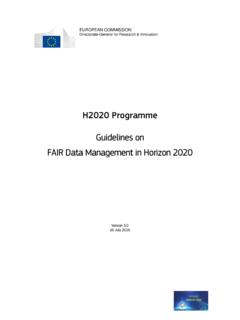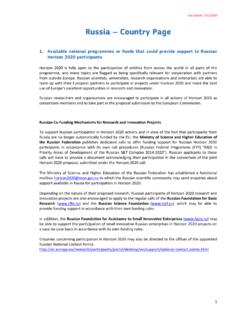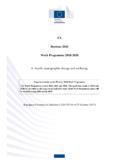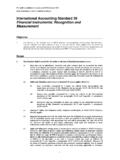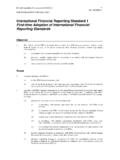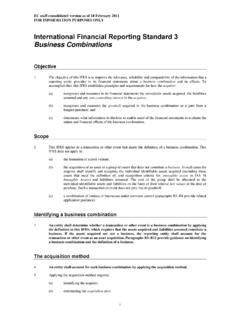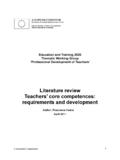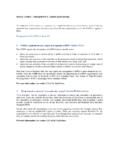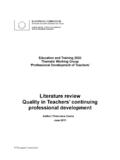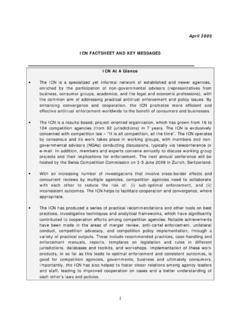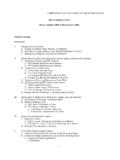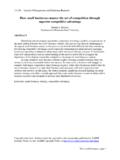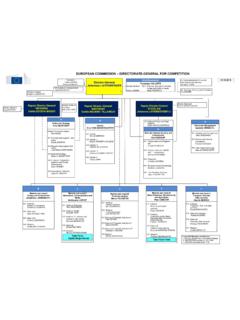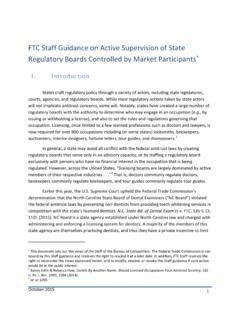Transcription of Competition policy brief - ec.europa.eu
1 Competition policy briefs are written by the staff of the Competition Directorate-General and provide background to policy discussions. They represent the authors view on the matter and do not bind the Commission in any way. KD-AK-18-001-EN-N, doi European Union, 2018 Reproduction is authorised provided the source is acknowledged. More publications on: and In a nutshell In its Coty judgment, the Court of Justice confirmed that selective distribution systems designed to preserve the luxury image of products can comply with Article 101(1) TFEU. Analysis of whether or not a marketplace ban in a selective distribution agreement escapes the application of Article 101(1) TFEU must be based on the so-called Metro-criteria.
2 Even if marketplace bans were to restrict Competition in individual cases, they do not constitute a hardcore restriction under Articles 4 b) or 4 c) of the Vertical Block Exemption Regulation. Occasional discussion papers by the Competition Directorate General of the European Commission 2018-01 | April 2018 ISBN 978-92-79-81339-9, ISSN: 2315-3113 Competition policy brief EU Competition rules and marketplace bans: Where do we stand after the Coty1 judgment? Introduction On 10 May 2017, the Commission published the Final Report on the E-commerce Sector Inquiry ("Report").
3 2 The Report confirms that the growth of e-commerce over the last decade had a significant impact on companies distribution strategies and customer behaviour. The Report, inter alia, points to the importance of marketplaces as online sales channels, in particular for smaller and medium-sized retailers. However, the Report highlights that the importance of marketplaces as an online sales channel differs from one Member State to another to a significant extent with a high proportion of retailers using marketplaces in Germany (62 %) and the United Kingdom (43 %) compared to a substantially smaller proportion in Austria (13 %), Italy (13 %) or Belgium (4 %).
4 According to the Report, 18 % of retailers have agreements with their suppliers that contain restrictions on marketplace sales. The Member States with the highest proportion of retailers experiencing marketplace restrictions are Germany (32 %) and France (21 %). Proportion of retailers in each Member State that have agreements containing marketplace restrictions 1 Judgment of 6 December 2017, Coty Germany GmbH vs Parf merie Akzente GmbH, C-230/16, EU:C:2017:941. 2 Final report on the E-commerce Sector Inquiry, COM(2017) 229 final.
5 Marketplace restrictions encountered in the E-commerce Sector Inquiry range from absolute bans to restrictions on selling on marketplaces that do not fulfil certain quality criteria. Restrictions on the use of marketplaces are mostly found in selective distribution agreements, closed distribution systems where the supplier distributes its product(s) only through authorized retailers which are chosen based on a number of specified With these market developments the question of whether contractual restrictions limiting the ability of retailers to sell via online marketplaces ("marketplace bans" or "platform bans")
6 Are compatible with EU Competition rules has attracted significant attention and led to different interpretations of the applicable EU Competition rules in recent years. The judgment of the European Court of Justice in case C-230/16, Coty Germany GmbH vs Parf merie Akzente GmbH, of 6 December 2017 ("Coty judgment")4 was therefore highly anticipated as the Court of Justice was asked about the legal qualification of marketplace bans under Article 101(1) TFEU as well as under the VBER. 3 A definition of selective distribution systems under EU Competition rules can be found in Article 1(1)(e) of the Vertical Block Exemption Regulation (Commission Regulation (EU) No 330/2010 of 20 April 2010 on the application of Article 101(3) of the Treaty on the Functioning of the European Union to categories of vertical agreements and concerted practices, OJ L 102, , p.)
7 1, "VBER"). 4 Judgment of 6 December 2017, Coty Germany GmbH vs Parf merie Akzente GmbH, C-230/16, EU:C:2017:941. EU Competition rules and marketplace bans | Competition policy brief 2 The aim of this policy brief is to follow-up on the Report in relation to marketplace bans and to provide stakeholders with the view of DG Competition in the light of the Coty judgment. The facts of the Coty case and the questions referred by the Higher Regional Court of Frankfurt am Main to the Court of Justice The case concerned a contractual restriction included in a selective distribution agreement between Coty Germany GmbH ("Coty"), which is one of Germany's leading suppliers of luxury cosmetics, and one of its distributors, Parf merie Akzente GmbH ("Parf merie Akzente").
8 The contractual clause prohibited the discernible engagement by Parf merie Akzente of a third-party undertaking which is not an authorized retailer of Coty. Coty sought to prohibit Parf merie Akzente from distributing its products on " " through Amazon's marketplace which enables third-party sellers such as Parf merie Akzente to sell products alongside Amazon's offerings. Coty's claim was dismissed by the German Regional Court of Frankfurt as it considered that the contractual clause restricting the sale via third-party platforms infringed 1 GWB and Article 101 TFEU and constituted in view of that court a hardcore restriction under Article 4(c) VBER.
9 Coty appealed against that decision before the referring court. Based on the diverging interpretations of the applicable EU Competition rules in Germany, the Higher Regional Court of Frankfurt am Main decided to stay the proceedings and asked the Court of Justice to clarify whether a ban on using third party platforms in a selective distribution agreement for luxury goods may be compatible with Article 101(1) TFEU (Question 2) and whether such a restriction constitutes a hardcore restriction within the meaning of Articles 4(b) and 4(c) of the VBER (Questions 3 and 4). In its first question, the referring Court asked whether following the Pierre Fabre judgment5 selective distribution systems that have as their aim the distribution of luxury goods and primarily serve to preserve a "luxury image" for the goods may as such constitute an aspect of Competition that is compatible with Article 101(1) TFEU.
10 The judgment of the Court of Justice The first question In its response to the first question the Court of Justice held that a selective distribution system for luxury goods can comply with Article 101(1) TFEU provided that resellers are chosen on the basis of objective criteria of a qualitative nature, laid down uniformly for all potential resellers and not applied in a discriminatory fashion, that the characteristics of the product in question necessitate such a network in order to preserve its quality and ensure its proper use and, finally, that the criteria laid down do not go beyond what is necessary (often referred to as 5 Judgment of 13 October 2011, Pierre Fabre Dermo-Cosm tique.)
